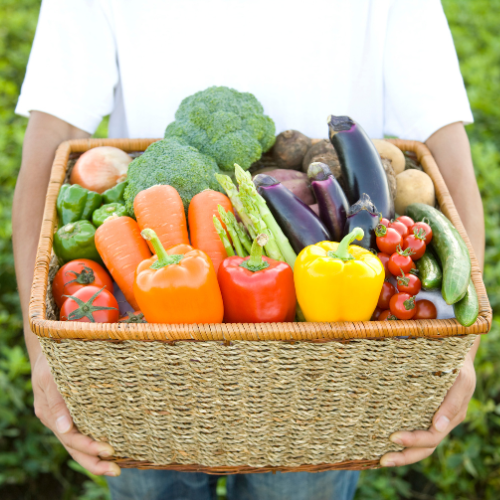
12 Powerful Vegetables To Prevent Colon Cancer
Colon cancer, a leading cause of cancer-related deaths worldwide, might find its nemesis in the very foods we sometimes overlook: vegetables.
It’s becoming increasingly evident that our dietary habits can either become our strongest ally or our silent foe.
Some vegetables, with their unique array of nutrients, have shown potential for fortifying our defenses against this formidable adversary.
Today, we’ll embark on a journey through 12 remarkable vegetables that may play a pivotal role in guarding against colon cancer.
Now, onto these powerful veggies!
Number 12. Brussels Sprouts
Often referred to as mini-cabbages, Brussels sprouts are more than just a side dish.
They belong to the renowned cruciferous family, a group that also includes broccoli, cauliflower, and kale.
What sets Brussels sprouts apart is their rich concentration of a compound called sulforaphane.
Research has taken a keen interest in sulforaphane due to its potential anticancer properties.
Studies have indicated that this compound may play a role in the detoxification of carcinogens, thereby potentially preventing their interaction with DNA and reducing the risk of mutations that could lead to cancer.
Additionally, sulforaphane has shown promise in inhibiting the growth and proliferation of cancer cells, particularly in the colon.
It’s worth noting that cooking can affect the sulforaphane content of Brussels sprouts.
To maximize their benefits, it’s recommended to steam or lightly sauté them, rather than boiling, which can reduce their nutritional potency.
Beyond sulforaphane, Brussels sprouts also offer a hearty dose of fiber, vitamin K, and vitamin C, making them a healthful addition to any meal.
Number 11. Artichokes
These unique, thistle-like vegetables have been a staple in Mediterranean cuisine for centuries.
Beyond their distinct taste, artichokes are brimming with health benefits, particularly for the digestive system and potentially in cancer prevention.
Firstly, artichokes boast an impressive fiber content.
Fiber is essential for promoting bowel regularity, reducing the risk of constipation, and ensuring that waste is efficiently expelled from the body.
A healthy, regular bowel movement can reduce the time potential carcinogens stay in contact with the colon lining, thus potentially reducing the risk of colon cancer.
But what truly sets artichokes apart is their rich antioxidant profile.
One of the notable compounds found in artichokes is silymarin.
Predominantly recognized for its protective effects on the liver, silymarin has also gained attention in the realm of cancer research.
Some studies suggest that silymarin can inhibit the growth and proliferation of certain cancer cells, including those of the colon.
Additionally, the cynarin in artichokes stimulates bile production, which aids in digestion and the absorption of vital nutrients.
It also has potential anti-inflammatory properties that could further bolster colon health.
Incorporating artichokes into your meals not only elevates their flavor profile but could also be a strategic step in colon cancer prevention.
Whether you steam them, grill them, or use their hearts in salads and dips, their health benefits are as rich as their taste.
Number 10. Swiss Chard
This leafy green, with its vibrant stems and dark, crinkled leaves, is more than just a visual delight in the garden or on the plate.
Swiss chard stands out as a nutritional powerhouse, offering a range of benefits that could play a pivotal role in colon health and cancer prevention.
Swiss chard is a prime source of dietary fiber.
Fiber, as we know, plays an essential role in digestive health.
It ensures the smooth transit of food through the digestive tract, reduces the risk of constipation, and assists in the removal of waste products.
By ensuring that waste doesn’t linger for prolonged periods in the colon, fiber potentially minimizes the risk of harmful substances coming into extended contact with the colon’s lining.
Moreover, Swiss chard is loaded with a plethora of vitamins, particularly vitamin K, A, and C.
Vitamin K is essential for bone health, while vitamins A and C are potent antioxidants that combat oxidative stress.
Oxidative stress, if unchecked, can damage cells and DNA, potentially leading to the formation of cancerous cells.
Beyond vitamins, Swiss chard offers a good dose of magnesium, potassium, and iron.
These minerals play diverse roles in maintaining overall health, from muscle function to red blood cell formation.
But perhaps what sets Swiss chard apart is its content of betalains—a group of antioxidant compounds that not only give the vegetable its unique color but also exhibit detoxifying properties.
By promoting the elimination of toxins and potentially harmful compounds, betalains might further bolster the health of the colon and reduce cancer risk.
Number 9. Beetroot
These earthy, crimson gems are more than just a colorful addition to your plate; they could be a formidable ally in the fight against colon cancer.
The deep, rich color of beetroot can be attributed to a class of pigments called betacyanins.
These pigments, particularly betanin, are not only responsible for bestowing beets with their characteristic hue but also have potent antioxidant properties.
Antioxidants are crucial in combating free radicals – rogue molecules that can cause cellular damage.
Left unchecked, this damage can escalate, potentially leading to the development of cancer cells.
Several research studies have spotlighted the anticancer potential of beetroot extract.
One study, in particular, revealed that the betanin in beetroots inhibited the growth and proliferation of tumor cells in the colon.
While more comprehensive research is needed, the preliminary findings are undoubtedly promising.
Beyond betacyanins, beetroots are a bountiful source of dietary fiber.
As we’ve discussed previously, fiber plays an indispensable role in colon health.
It aids digestion, ensures timely elimination of waste, and reduces the time potential carcinogens spend in contact with the colon wall.
Moreover, beetroots are rich in essential vitamins and minerals, including vitamin C, folate, and manganese.
Folate is especially noteworthy, as it plays a pivotal role in DNA synthesis and repair, further offering a protective shield against carcinogenic mutations.
Number 8. Asparagus
Asparagus is brimming with a variety of nutrients, but one of its standout compounds is glutathione.
Often referred to as the “master antioxidant,” glutathione plays a pivotal role in our body’s defense mechanisms.
This molecule actively neutralizes free radicals, mitigates oxidative stress, and, importantly for our context, helps in detoxifying harmful substances, including potential carcinogens.
Research has shown that glutathione isn’t just a passive detoxifier.
It’s actively involved in the DNA synthesis and repair process, thereby offering a level of protection against mutations that could pave the way for cancerous growth.
A study found that individuals with lower glutathione levels experienced a higher susceptibility to the carcinogenic effects of certain compounds, underscoring their vital role.
Moreover, asparagus contains a respectable amount of dietary fiber.
As we’ve touched upon before, fiber is paramount for healthy digestion and regular bowel movements, reducing the potential for harmful substances to linger in the colon.
Rounding off its impressive profile, asparagus is also rich in vitamins like folate and Vitamin K and minerals such as iron.
These nutrients support overall well-being and can play a supportive role in cancer prevention.
Number 7. Carrots
Orange, crunchy, and irresistibly sweet carrots are often recognized for promoting eye health.
But their benefits stretch far beyond just bolstering vision.
The vibrant orange hue of carrot is a direct indication of its rich beta-carotene content.
Beta-carotene, a type of provitamin A, is a powerful antioxidant that combats oxidative stress, a factor that may contribute to the initiation and progression of cancer.
Once ingested, our body converts beta-carotene into vitamin A, which is crucial for cell growth and differentiation.
Some epidemiological studies have found an association between a higher intake of beta-carotene-rich foods and a lower risk of certain types of cancer, including colon cancer.
But there’s more to carrots than just beta-carotene.
Enter falcarinol. This natural compound has sparked interest in the scientific community for its anti-cancer potential.
One study on rats showcased that those fed carrots containing falcarinol had a one-third lower risk of developing cancerous tumors than those who didn’t receive the compound.
While more research is needed to understand the exact mechanisms, falcarinol appears to disrupt the growth of cancer cells.
Additionally, let’s not forget the dietary fiber in carrots.
Beyond promoting digestive regularity, fiber is known to bind with certain carcinogens, potentially reducing their harmful impact on the colon lining.
Number 6. Peas
More than just a staple side dish, peas are nutritional powerhouses, offering multiple benefits for your health, especially for the colon.
While their modest size might be deceiving, peas pack a punch when it comes to dietary fiber.
Consuming fiber-rich foods like peas can greatly aid in promoting regular bowel movements.
This regularity is essential in expelling waste products efficiently, ensuring toxins and potential carcinogens don’t linger in the colon for extended periods.
Fiber helps lower the risk of cell damage and, eventually, the growth of cancerous lesions by shortening the time that these harmful compounds come into contact with the lining of the colon.
But that’s not all.
Peas are also a good source of several vitamins and minerals.
Among them, the B-vitamin folate stands out.
Folate plays a critical role in DNA synthesis and repair.
When folate levels are suboptimal, it may lead to DNA mutations, potentially paving the way for cancer.
Some studies suggest that a higher intake of folate-rich foods, such as peas, may be associated with a reduced risk of colorectal cancer.
Moreover, the rich array of phytonutrients in peas, including saponins and phenolic acids, also exhibit antioxidant properties.
These compounds help combat oxidative stress, a culprit behind DNA damage and the onset of various diseases, including cancer.
Number 5. Garlic
Garlic, revered both for its culinary appeal and medicinal properties, is a vital ingredient in many global cuisines.
But beyond its aromatic flavor, garlic carries substantial health benefits, particularly in the realm of cancer prevention.
The story of garlic’s protective properties starts with its rich array of compounds, with allicin being the most notable.
When garlic is crushed or chopped, an enzymatic process is set in motion, converting the compound alliin to allicin.
Allicin, with its characteristic pungent aroma, is responsible for many of garlic’s health benefits.
Researchers have turned their attention to garlic and its derivatives for decades, aiming to uncover their potential anti-cancer effects.
Studies have indicated that garlic might help prevent cancer through multiple mechanisms.
These include stopping the body from making carcinogens, speeding up DNA repair, killing cancer cells through a process called apoptosis, and stopping cancer cells from multiplying.
Moreover, in the context of colon health, several studies suggest a favorable relationship between garlic intake and a reduced risk of colorectal cancer.
One study, for instance, found that regular consumption of garlic was associated with a reduced risk of developing colorectal tumors.
Another interesting observation is that certain sulfur compounds in garlic can reduce the activation and increase the detoxification of carcinogens, rendering them less harmful.
The high content of organosulfur compounds in garlic has also been of particular interest.
These compounds have shown potential in inhibiting inflammation, a significant factor in various chronic diseases, including cancer.
It’s worth noting that while the consumption of garlic in its natural form (i.e., raw or cooked) is beneficial, garlic supplements might not always deliver the same results.
The processing of these supplements can sometimes alter or reduce the compounds responsible for garlic’s health benefits.
Number 4. Eggplant
Eggplants, also known as aubergines in many parts of the world, are those shiny, deep purple vegetables that have found their way into countless dishes across various cuisines.
Beyond their culinary versatility, they carry an array of health benefits that make them an excellent addition to our diets.
At the forefront of these benefits is a compound called chlorogenic acid, which has earned its reputation for being a potent antioxidant.
But what does this mean in the context of cancer prevention?
Antioxidants, as the name suggests, combat oxidation, a natural process in our bodies.
While oxidation is necessary for survival, excessive oxidative stress can lead to cell damage, which is where antioxidants come in.
These protective substances eliminate free radicals, dangerous molecules brought on by oxidative stress.
This stops cells from getting damaged, which can lead to cancer.
Chlorogenic acid, prevalent in eggplants, is one such antioxidant that has been extensively studied.
It’s found in the skin of the eggplant, giving it its vibrant color.
Apart from its antioxidant properties, chlorogenic acid has been shown in some studies to have anti-cancer, anti-inflammatory, and antiviral activities.
Research suggests that chlorogenic acid might impede the growth of cancer cells by interrupting certain pathways involved in cancer cell proliferation.
Moreover, its anti-inflammatory effects can further aid in reducing the risk of chronic diseases, including cancer.
For those concerned about the risk of cancer, particularly colon cancer, incorporating eggplants into their diet can be a proactive approach.
The fibers in eggplants also support digestive health, adding another layer of potential protection against colon cancer.
To maximize the benefits, consider consuming eggplants with their skin, where much of the chlorogenic acid resides.
Number 3. Turmeric
Though not technically a vegetable, turmeric earns its spot on our list because of its potent properties.
A vibrant golden-hued spice that has been at the heart of many culinary traditions, turmeric’s health benefits extend far beyond the kitchen.
Central to its therapeutic attributes is a compound called curcumin, which gives turmeric its distinctive color.
Curcumin is celebrated for its powerful anti-inflammatory abilities.
Chronic inflammation is seen as a precursor to several ailments, including cancer.
By acting on various inflammatory pathways, curcumin can potentially offset these risks.
When it comes to colon cancer, in particular, curcumin’s effects have been extensively studied and are quite promising.
It can interfere with the life cycle of cancer cells, slowing or halting their proliferation.
Additionally, curcumin has a unique capability to promote apoptosis, which is essentially a process where the cancer cells are programmed to self-destruct.
This is pivotal in controlling unchecked cell growth.
Another fascinating aspect of curcumin’s battle against cancer is its ability to inhibit angiogenesis, the formation of new blood vessels that tumors use to grow.
By disrupting this process, curcumin effectively starves the tumor of its essential nutrients.
Moreover, curcumin has shown potential in reducing metastasis, the spread of cancer cells to other parts of the body, which is a significant concern in the progression of cancer.
However, it’s worth noting that while curcumin is a powerhouse, its bioavailability is a challenge.
When consumed in its natural state, our bodies don’t easily absorb curcumin.
But there’s a workaround.
Combining turmeric with black pepper, which contains a compound called piperine, can boost curcumin’s absorption.
This pairing isn’t just a modern realization; it’s reflected in traditional recipes that have long married the two spices, optimizing not only flavor but also health benefits.
Number 2. Tomatoes
These vibrant orbs, a staple in kitchens worldwide, bring more to the table than just taste.
Their rich red color is a direct result of a powerful antioxidant called lycopene.
Lycopene is part of the carotenoid family, compounds responsible for the bright colors we see in many fruits and vegetables.
When we talk about cancer, particularly colon cancer, oxidative stress plays a nefarious role.
It results from an imbalance between free radicals and our body’s ability to counteract their harmful effects.
Free radicals can damage DNA, proteins, and lipids, setting the stage for various diseases, including cancer.
This is where lycopene steps in.
Lycopene has been shown to neutralize these free radicals, effectively mitigating oxidative damage.
Several epidemiological studies have indicated that individuals with a higher intake of tomatoes or tomato-based products have a reduced risk of certain types of cancer.
One possible reason for this is that lycopene can change intercellular gap junction communication.
This is how cells share information and plan their responses.
Efficient communication between cells can prevent the transformation of a regular cell into a cancerous one.
Furthermore, research also highlights lycopene’s role in regulating the cell cycle and promoting apoptosis in cancerous cells.
Essentially, it nudges malignant cells towards a path of self-destruction, curtailing their growth.
But there’s a catch: the human body better absorbs lycopene from cooked tomatoes than raw ones.
The process of cooking breaks down the cell walls of tomatoes, making lycopene more accessible.
So, those tomato sauces, stews, and soups are not just comforting but also health-boosting.
Pairing tomatoes with a healthy fat source, like olive oil, can further enhance lycopene absorption, as it’s fat-soluble.
Number 1. Red Bell Peppers
When you slice into a red bell pepper, it’s hard to ignore its vibrant hue and crunchy texture.
But the allure of this vegetable doesn’t stop at its sensory delights.
Red bell peppers stand tall as guardians of our health in more ways than one might assume.
Starting with their vitamin C content, these peppers are veritable powerhouses.
Vitamin C, as most of us know, is an essential nutrient, known primarily for its immune-boosting properties.
But its role goes far beyond that. It’s a potent antioxidant that combats free radicals in the body.
As previously mentioned, free radicals can induce DNA damage, potentially setting the stage for cancerous cell formation.
By scavenging these radicals, vitamin C acts as a shield, protecting our cells from potential harm.
Another compelling component of red bell peppers is bioflavonoids.
These are a group of plant-derived polyphenolic compounds, often found alongside vitamin C in many foods.
The synergy between vitamin C and bioflavonoids is noteworthy.
While vitamin C neutralizes free radicals, bioflavonoids enhance the action of vitamin C, making them a formidable duo against oxidative stress.
Moreover, bioflavonoids have been found to interfere with the life cycle of cancer cells.
Some studies suggest that they can inhibit the growth and spread of tumor cells, induce apoptosis (programmed cell death) in cancerous cells, and even disrupt the blood supply to tumors.
But it’s not just about what’s inside these peppers.
Their dietary fiber contributes to gut health, ensuring a smooth digestive process.
A healthy digestive system ensures that waste products and potential carcinogens are swiftly removed from the body, further reducing the risk of colon cancer.
Incorporating red bell peppers into your diet can be both a gastronomic and health-enhancing experience.
Their versatility means they can be enjoyed raw in salads, roasted as a side dish, or even stuffed with your favorite fillings.
Every bite brings with it a promise of better health and a celebration of flavors.
And there you have it, 12 Powerful Vegetables To Prevent Colon Cancer.
The vegetables we discussed today are not just delicious culinary choices, but they are also fortified guardians of our colon health.
Making room for them on your plate could be one of the most empowering choices you make for your well-being.
But remember, while the science speaks volumes about the protective benefits of these foods, it’s essential to personalize dietary choices based on individual needs.
Always work alongside healthcare professionals, keeping them in the loop about your dietary preferences and any health concerns.
Thanks for being a part of our community, for prioritizing your health, and for championing informed decisions.
Until next time, keep flourishing and savoring the goodness of nature.
Stay healthy, stay informed, and keep thriving!









